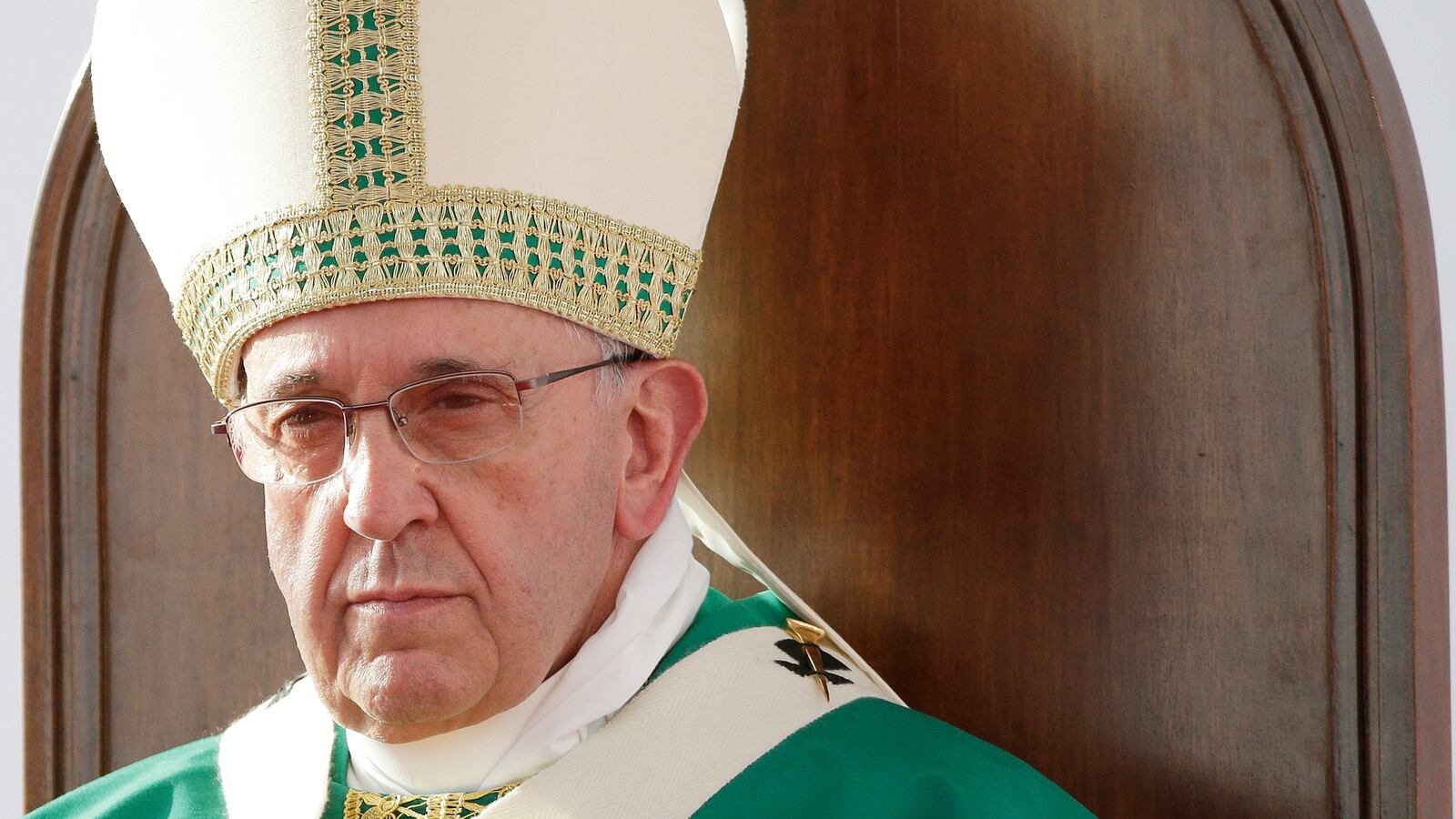To listen to the wave of breathless media coverage of Pope Francis’ recent remarks regarding intervention in Iraq on behalf of persecuted minorities, one would think the pontiff had expressed unqualified enthusiasm about the use of military force. Numerous outlets reported that he had called for “military action” against the ISIS terror group. Writing at Vox, Max Fisher went so far as to compare Francis’ position on intervention to a call for another crusade.
“There is good precedent for this,” Fisher wrote. “During the Middle Ages, between 1096 and 1272 AD, popes also endorsed the use of Western military action to destroy Middle Eastern caliphates. Those were known as the crusades; there were nine, which means that this would be number 10.”
To earn an interpretation like that, Francis surely called for heads on spikes and Christian standards draped over the gates of Iraqi cities, right? But the Pope’s comments on Monday were in reality characteristically thoughtful and measured, providing little grist for the crusade rumor mill.
“In these cases, where there is an unjust aggression, I can only say that it is licit to stop the unjust aggressor…I underscore the verb 'stop,'” Francis said. “I'm not saying 'bomb' or 'make war,' just 'stop.' And the means that can be used to stop them must be evaluated…One nation alone cannot judge how you stop this, how you stop an unjust aggressor.”
First, it’s important to clarify what Pope Francis is requesting be stopped. He is not indicating that ISIS should be stopped in general terms, but that they unjust aggression against minority religious groups should be stopped – a feat that could be accomplished by removing those persecuted groups from ISIS occupied territories either permanently or temporarily.
Francis’ emphasis on unjust aggression as the problem to pinpoint also underscores the fact that his interest is in human dignity rather than the preservation of a specific religious community. Unlike the typical framing of, say, a medieval crusade, Pope Francis has openly objected the ill treatment of all religious minorities under assault from ISIS, a theme these recent comments bear out well. And his universal appeal for the safety of threatened minorities doesn’t match up with the Cross-versus-crescent rhetoric summoned to mind by accusations of crusading.
It’s also worthwhile to pay serious attention to Francis’ unwillingness to assign special favor to any particular strategy of intervention. He was especially careful to note that many “wars of conquest” have been carried out under the banner of humanitarian intervention, and emphasized that the participation of various global powers will be key to ensuring whatever intervention takes place does not degenerate into a self-serving military action.
Pope Francis’ repeated prayers for peace and calls for the protection of groups facing genocide recalls Pope John Paul II’s great sympathy for Muslims similarly persecuted during the Bosnian War of the 1990s. In 1994, Pope John Paul II demanded that “all forms of action aimed at disarming the aggressor” be carried out in Bosnia, where Serbian Christians were slaughtering Bosnian Muslims, and systematically raping women and girls. The Vatican decried the “utterly shameful cowardliness” of the international community in putting off intervention for so long – evidently a pattern Pope Francis is unwilling to see revisited.
For his efforts in encouraging humanitarian intervention and supporting oppressed religious minorities, Pope John Paul II has enjoyed enormous popularity among the people of Bosnia and Herzegovina, who erected a monument to the pontiff in 2011 to honor his commitment to the defense of peace and human dignity.
Both Pope John Paul II and Pope Francis have deployed in their ministry against genocide similar emphases on peace, international collaboration, and concern for human dignity. A side-by-side comparison of Pope Francis’ remarks with medieval papal bulls agitating for crusades would reveal very little similarity in terms tone or content, and the suggestion that Pope Francis is a crusader in disguise is still dangerously irresponsible.
There is already some agitation for what would amount to a Christian assault on ISIS based mainly on religious grounds, and it seems unlikely that wiser policy will be produced by creating the delusion of Christian consensus on unilateral American military force aimed at destroying ISIS entirely. What Pope Francis’ contribution to our public conversation about how to respond to the crimes against humanity currently taking place in Iraq offers is nuance and reflectiveness – both qualities are washed out by clumsily filing him away as a nouveau crusader. For Americans, decisions about intervention abroad hearken back to recent bad experiences in Iraq and Afghanistan, which is precisely why we should take Francis’ advice seriously when he talks about international collaboration and a sincere evaluation of what methods to use in the protection of minorities.
Generally, Pope Francis enjoys broad public reach, and as his ministry has remained committed to the needs of the vulnerable and impoverished, his input has grown in moral credibility. It’s a shame that such a well-considered message – one that clearly seeks to avoid repeating mistakes of the past – should be given such a facile and bad-faith reception.
In twenty years, Pope Francis may well be honored just like John Paul II for supporting the abused even when political currents were murky and ambivalent. And when survivors of genocide are thanking him for remaining faithful to their human dignity, all this clickbaiting about crusades will look very strange.






